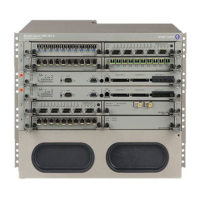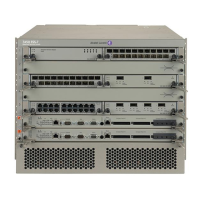Configuring IP Router Parameters
30 Router Configuration Guide
Typical routers only support proxy ARP for directly attached networks; the router is targeted
to support proxy ARP for all known networks in the routing instance where the virtual
interface proxy ARP is configured.
In order to support DSLAM and other edge like environments, proxy ARP supports policies
that allow the provider to configure prefix lists that determine for which target networks
proxy ARP will be attempted and prefix lists that determine for which source hosts proxy
ARP will be attempted.
In addition, the proxy ARP implementation will support the ability to respond for other hosts
within the local subnet domain. This is needed in environments such as DSL where multiple
hosts are in the same subnet but can not reach each other directly.
Static ARP is used when an Alcatel-Lucent router needs to know about a device on an
interface that cannot or does not respond to ARP requests. Thus, the configuration can state
that if it has a packet with a certain IP address to send it to the corresponding ARP address.
Use proxy ARP so the router responds to ARP requests on behalf of another device.
Exporting an Inactive BGP Route from a VPRN
The export-inactive-bgp command under config>service>vprn introduces an IP VPN
configuration option that allows the best BGP route learned by a VPRN to be exported as a
VPN-IP route even when that BGP route is inactive due to the presence of a more preferred
BGP-VPN route from another PE. This “best-external” type of route advertisement is useful
in active/standby multi-homing scenarios because it can ensure that all PEs have knowledge
of the backup path provided by the standby PE.
DHCP Relay
Refer to the Triple Play Guide for information about DHCP relay and support, as well as
configuration examples.
Internet Protocol Versions
The TiMOS implements IP routing functionality, providing support for IP version 4 (IPv4)
and IP version 6 (IPv6). IP version 6 (RFC 1883, Internet Protocol, Version 6 (IPv6)) is a
newer version of the Internet Protocol designed as a successor to IP version 4 (IPv4) (RFC-
791, Internet Protocol). The changes from IPv4 to IPv6 effect the following categories:

